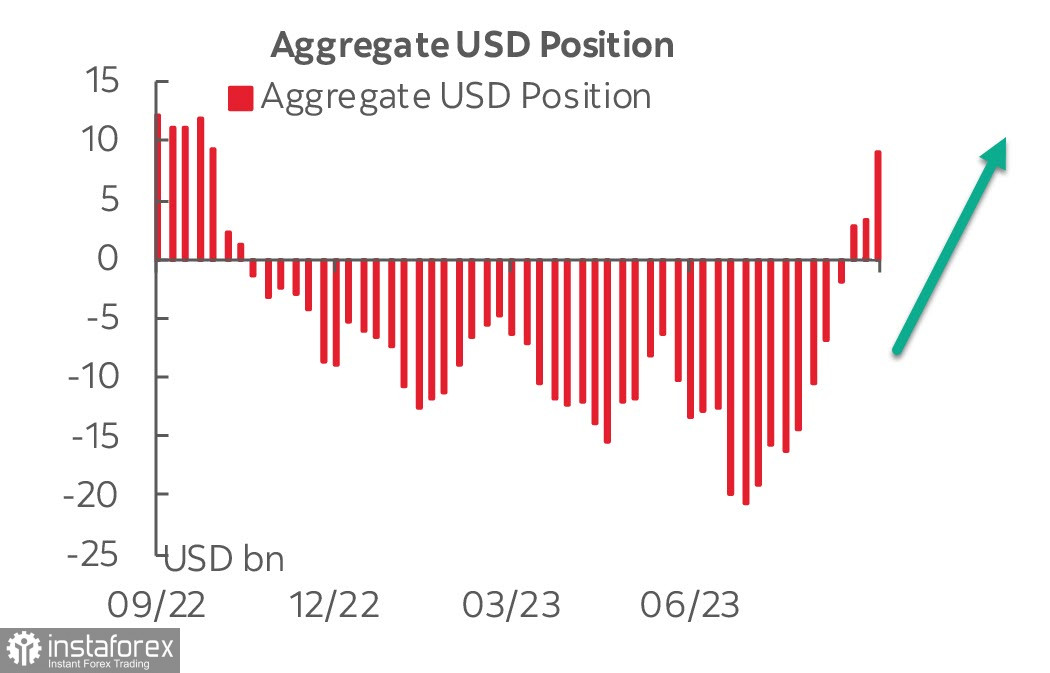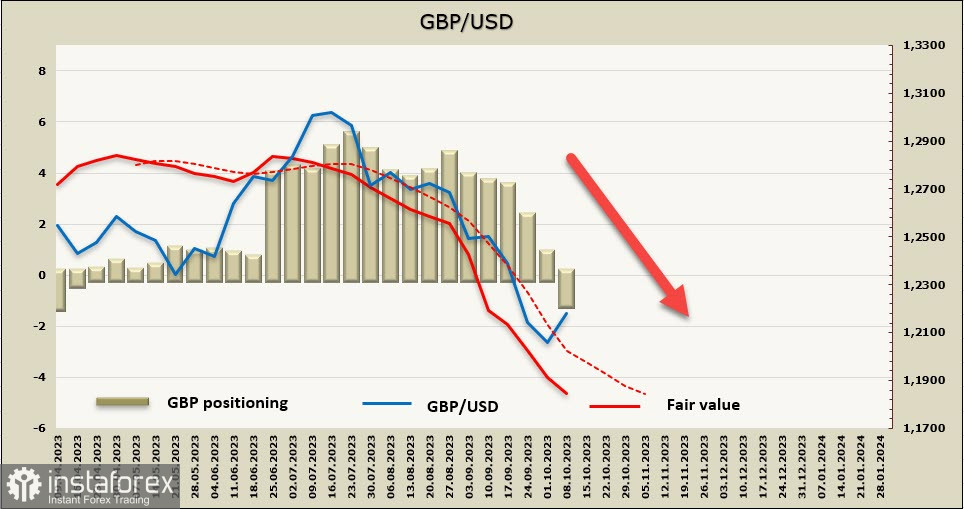As indicated by the latest CFTC report, there have been significant changes in positioning. Several commodity currencies, particularly those oriented toward the Chinese and Asian markets, have slightly improved their positions. This applies to the Australian and New Zealand dollars. However, European currencies have experienced sharp sell-offs, as a result, the US dollar's net position increased by 5.3 billion to 8.7 billion. This is the strongest result for the USD in a year.

The USD has also benefited from a significant decline in long positions in gold, which dropped - 5.4 billion, and falling demand for oil. In a broader sense, the changes in currency positioning reflect growing concerns about the economic prospects of the eurozone, which appears to be entering a serious crisis.
The U.S. labor market showed continued resiliency in September, adding 336,000 jobs last month and unemployment remaining unchanged at 3.8%. This situation presents challenges for the Federal Reserve, which may need to maintain higher interest rates for an extended period to control inflation. As a result, the yield on 10-year Treasury bonds reached 4.89%, the highest level since 2007.
The main event will be the inflation report for September on Thursday. Core inflation is projected to decrease from 4.3% year-on-year to 4.1%. If these forecasts prove accurate, speculation about an overly strong employment report will largely be mitigated. The market will return to a more stable state, and the dollar will dominate.
EUR/USD
The Sentix Economic Index for the Eurozone slightly worsened in October, down 0.4 points from the previous month to negative 21.9 points, but the assessment of the current situation, which stands at -27, is the lowest level since November 2022. The trend toward a full-scale recession persists, especially in Germany, where there are almost no positive signals.
Investor pessimism is further fueled by the European Central Bank's stance, which lacks the tools to improve the economic situation. Under normal circumstances, central banks support a weakening economy, as was observed during the 2008 crisis, in 2011, and during the pandemic, but not this time. The ECB is in a wait-and-see position, which broadly means an absence of a clear and evident plan of action.
The German economy is in recession, with the Sentix assessment of the current situation reaching -39.5 points, the lowest value since July 2020, during the COVID-19 lockdown.
The net long EUR position decreased by 2.7 billion to 10.3 billion over the reporting week, indicating a bearish bias. The price is below the long-term average and is headed downwards, suggesting further decline.

EUR/USD is just one step away from the technical support level at 1.0405, which represents a 50% retracement from the euro's growth since September 2022. Last week's attempt at growth is considered a correction and doesn't provide grounds to assume that the euro will resume its upward movement. It is expected that after a short consolidation, the euro will break below the recent low of 1.0449, with the nearest target at 1.0405, after which the selling pressure may accelerate.
GBP/USD
UK service sector activity remained on a negative trajectory in September as cutbacks to non-essential business and consumer spending weighed on sales. Some support for business optimism came from the trend of decreasing inflation expectations, but this appears to be insufficient to support economic growth, as high interest rates exert a determining influence on household spending growth.
On Thursday, the UK will release a series of economic reports that will provide more information about third-quarter GDP growth, industrial production, the services index, construction activity, and trade. It is unlikely that the data will surpass expectations, as the rapid slowdown in the Eurozone is having a strongly negative impact on UK exports and is supporting a low level of activity in all sectors of the economy.
The pound lost another 1.7 billion during the reporting week, resulting in a net short position of -0.5 billion for the first time since April. The price is significantly falling.

The pound fell below the support level at 1.2074 but failed to settle below that mark. The subsequent rebound is clearly of a corrective nature and is unlikely to be prolonged. The upper limit for the corrective rise is seen at the level of 1.2305, but the pound has a low chance of reaching this mark. We expect the downward movement to resume at any moment, with the long-term target being 1.1740/90.
 English
English 
 Русский
Русский Bahasa Indonesia
Bahasa Indonesia Bahasa Malay
Bahasa Malay ไทย
ไทย Español
Español Deutsch
Deutsch Български
Български Français
Français Tiếng Việt
Tiếng Việt 中文
中文 বাংলা
বাংলা हिन्दी
हिन्दी Čeština
Čeština Українська
Українська Română
Română

